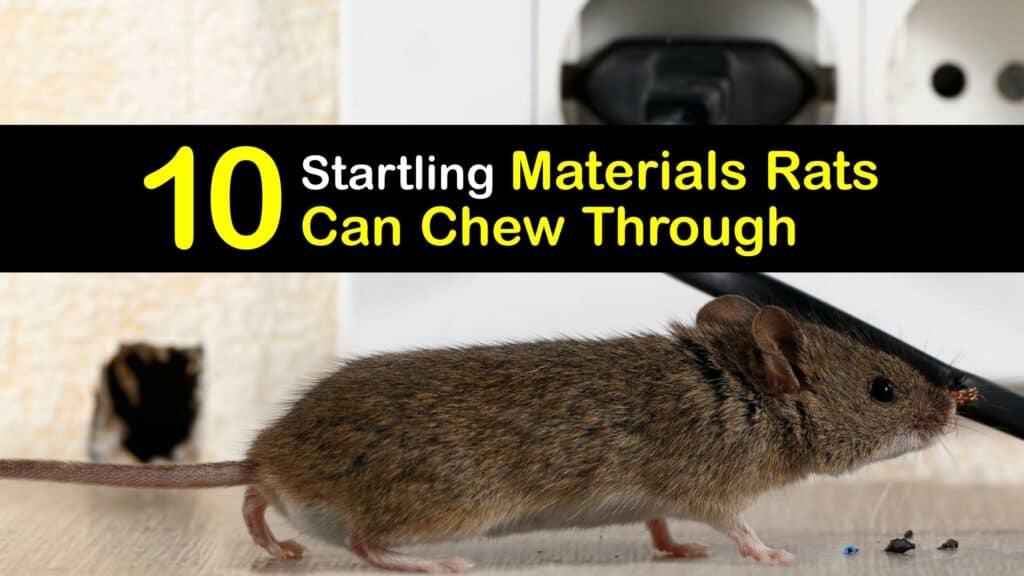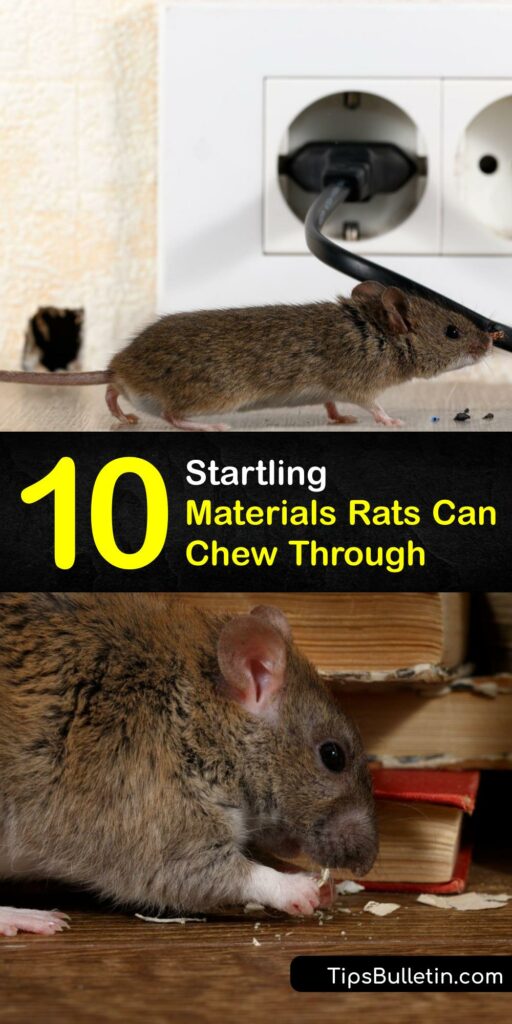Homeowners are often surprised by the materials rats can chew through, as rodents chew on everything. They file their teeth to keep them sharp, and their incisors never stop growing. Rats frequently chew, so it’s crucial to maintain their teeth in top condition. They have iron-hard teeth.
Rats are natural scavengers that rely on their durable teeth to ensure they reach food and shelter. The rodent uses its razor-sharp teeth to break through any obstruction if it cannot go over or under it. Can rats chew through metal? Objects we are confident are impassible to rats, such as wood, specific metals, and plastic, are actually no barrier.
Whether you find them cute or terrifying, there’s no denying rats are destructive. They feast on anything from electrical wires to pet food and the insulation in your walls. Have you ever wondered, “Can rats chew through wood?” Explore the types of substances rats gnaw through to aid you in your pest control or containment.

- Can Rats Chew Through Metal?
- Typical Rat Species That Damage Property
- Identifying a Rodent Problem
- Materials Rats Can Chew Through
- Can Rats Chew Through Wood?
- Can a Rat Chew Through Concrete?
- Can a Rat Chew Through Steel?
- Choosing a Material to Seal Entry Points
- Rat Traps to Catch Rats and Stop Chewing
- Essential Oil Spray to Stop Rat Destruction
- Techniques to Discourage Rat Infestation
Can Rats Chew Through Metal?
A rat infestation is no fun, and many people experiencing one have questions. If you have a pet rat or are conducting rodent control, you might be curious about the materials rats can chew through. Can rats chew through wood?
Exploring rats’ strengths and weaknesses, including the things they love and dislike and how strong their bite is, gives you the knowledge you need to remove them.
Typical Rat Species That Damage Property
Several varieties of rats are potentially behind your rat problem. Unfortunately, if you’re working to identify them from the chew marks and damage caused, it’s not possible. All rats have similar appetites and are equally destructive.
Aside from rats, other rodents, such as a house mouse or deer mouse, could contribute to the chewing. Fortunately, control and prevention function similarly regardless of the type of rats you’re dealing with.
Identifying a Rodent Problem
Without laying eyes on a rat scurrying around your attic or across your kitchen, it’s tough to believe you have a rodent infestation. Rats are timid and tend to be primarily active at night, so they’re unlikely to be spotted. Instead, search your house for indicators of rat activity.

Inspect structures and belongings for gnaw marks from rat teeth. Rats are burrowing rodents that build nests from soft materials, including paper and fabric. Torn insulation and rat droppings are common.
The nests look like fabric piles with holes leading down to a nest. A dead rodent is another strong indicator of rodent activity and a need for rat control. If you notice evidence of rats or suspect them, don’t wait to begin pest control – begin rat control promptly.
Materials Rats Can Chew Through
Rodent damage is a significant indicator you might have a problem. Though they are tiny, rats think there’s nothing too big to bite into. Typically, this involves these little pests chewing on wires, wood, pipes, and automobiles. Rats and mice can get into walls through chewing layers of drywall and insulation.
Rats chew and gnaw through an electrical wire and carries significant risk as a fire hazard. The infrastructure of PVC and lead pipes, such as drain pipes and interior plumbing, is also susceptible to rodent damage.
Critter control is vital. Select secure materials for the storage of food and other delicate products. Understanding the level of destruction rats are capable of helps demonstrate how serious pest control is. It also allows homeowners to choose safe materials to keep food and other items requiring protection.
Can Rats Chew Through Wood?
Rodents destroy many different types of wood buildings via chewing. Consider your home’s hardwood beams, baseboards, and doorframes no barrier to these pests. Rats primarily eat through wood to access new parts of your house to build a nest.
Wooden walls won’t deter mice and rats from looking for a potential nesting spot or tasty food. Though rats are incredibly agile and fit through the smallest openings, there are situations when a gap may not be large enough. Rodents nibble on the wood to widen the crack until it is large enough for them to pass through.
Can a Rat Chew Through Concrete?
A rat bite is incredibly powerful, yet concrete is exceptionally sturdy. Concrete is perfect for foundations, but given enough time, it decays. Burrowing creatures, including rats, are sometimes to blame for concrete damage. Rats occasionally chew on concrete, but it’s uncommon.
One of the most frequent issues related to concrete is sinking. Several things, including erosion and drainage problems, cause soil shifting. Though it’s less frequent, burrowing rats may cause soil displacement.
Rats burrow beneath anything to find a new home or to elude predators. Burrowing includes digging beneath concrete slabs and foundations, causing voids to form quickly, endangering the structural integrity of the slab and producing hazardous conditions.
Though it’s unlikely rats are feasting heavily on your concrete slab or walls, they could be reducing their integrity in other ways. Treat rats if you suspect they’re affecting the concrete in your house.
Can a Rat Chew Through Steel?
Rat traps are made primarily of hardened steel since rats bite through softer metals like lead, sheet metal, tin, and aluminum. The rat’s teeth have more difficulty cutting through steel because of its substantially higher durability.
Rats have chewed through steel pipes, but this is usually facilitated by corrosion-induced material weakness. New steel, in good condition, is generally impervious to rats.
Learning what materials are rodent-proof is some of the most critical pest info while dealing with an invasion. If you plan to store pet food in metal garbage cans, purchase ones made from sturdy steel.
Choosing a Material to Seal Entry Points
If you locate a small hole in your wall or around a window, this is likely an access point for rodents. One of the critical steps in rodent eradication is closing entry holes to avoid pests coming and going. Rats and mice will stay away if the access points to your home are cut off completely.
It’s tricky to know what to use to seal the hole, given rats’ chewing ability. While applying caulk is tempting, this is a temporary solution since rats eat it. Wire mesh is a wise selection for sealing holes. Be sure to select good quality steel wire to keep rodents out.
Rat Traps to Catch Rats and Stop Chewing
A proven way to eliminate pests is with traps. If you have chew marks, gnawed surfaces, and shredded insulation, a rat trap helps. Choose humane live traps instead of expensive and disgusting kill traps. Live traps ethically catch the rat, allowing you to relocate it with minimal contact.
Kill traps often require the user to have contact with a dead or dying animal. They pose a risk to your children and pets if they accidentally engage with them. The bucket and spoon trap is an example of a simple and efficient live rat trap.
Scoop a serving of peanut butter onto the spoon and place the spoon balanced on the edge of a counter or table. Set the bucket directly below the spoon. When the rat travels onto the spoon to eat the peanut butter, the utensil tips, and the rat tumbles into the bucket. Check the trap twice a day and cover the bucket with the lid during the relocation of caught rats.
Essential Oil Spray to Stop Rat Destruction
Rats have sensitive noses, making them highly adverse to certain aromas, including several essential oils. Make an herbal rat repellent with essential oils to prevent these critters from getting inside your home.
Shake 20 drops of the rat-deterring essential oil and a cup of water together. Use a sprayer to mist them over anything you hope to protect from being chewed.
Techniques to Discourage Rat Infestation
A few straightforward maintenance ideas help to make your living quarters less appealing to rats.
Combining these protocols with pest control increases your chances of preventing rats from chewing on your house and personal items.
You’ve probably asked yourself, “Can rats chew through metal?” Thankfully, rats eat their way through various surfaces, but not steel. Protect food items in steel trash cans and be aware rats have a powerful bite.
Like wildlife control, pest control takes time. Protect your valuables and combine rat traps and deterrents with good maintenance for faster results.

If you loved this insightful article on materials rats can chew through, please share this knowledge with your friends and family who might be asking, “Can rats chew through wood?” on Pinterest and Facebook.